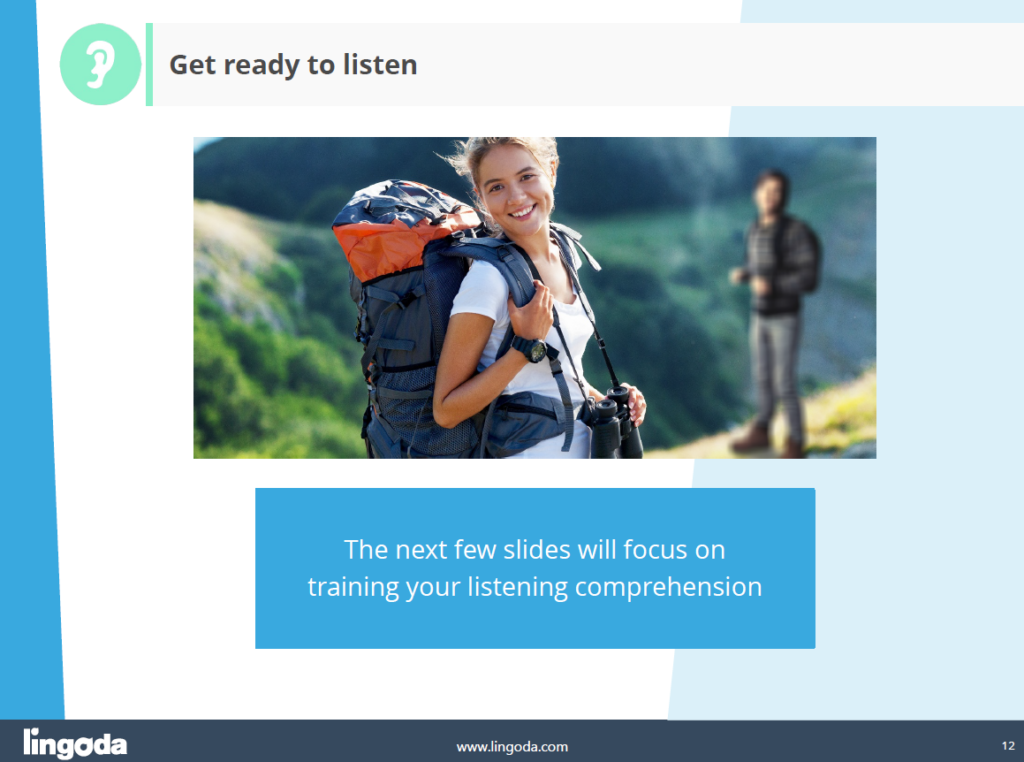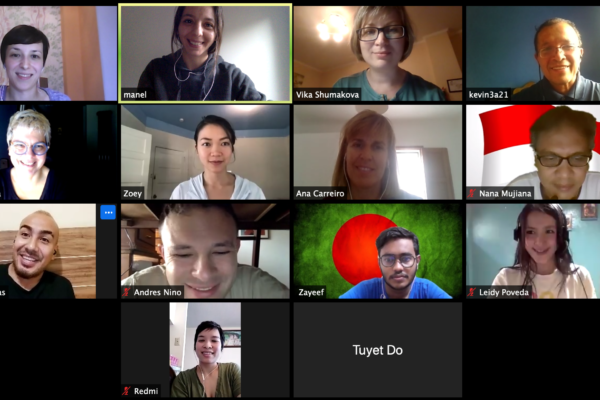In 2019 I took part in the Lingoda Marathon. In this series of articles, I share my experience and tips. As you might guess, this part is about pros and cons of the Lingoda Marathon.
PROS
1. The Platform and Learning Materials
Lingoda has a convenient and simple learning platform that is really easy to use. As you sign up and pay for the course you see all possible classes and teachers profiles.
You can also download materials before classes. The materials are interesting and engaging. The topics and the vocabulary are great.
For instance, in speaking classes, there are topics like Migration to the USA, History of English Language, Berlin in 90s, Einstein’s Stolen Brain, Why Do We Sleep, Food from Labs, The Rise of the Anti-hero, Ancient Civilizations.

Students can also choose some grammar or writing lessons (Comparison Essay, Future in the Past, Latin and Greek Roots of English words, Relative Clauses, Tense Shifting).
All the classes take place on Zoom.
You see the time of a lesson it in your own timezone in your profile on the platform. No need for a time converter.
Lingoda’s support team works really well providing all the necessary information in a matter of minutes if you go to live chat.
As for the payment, it was charged from my credit card automatically monthly as they stated in the marathon’s rules.
2. Teachers
As a seasoned English learner, I’ve encountered many English teachers in my life. But during the marathon, I had a new teacher and classmates almost every day during three months. Ans it’s an incredible experience.
During the marathon, you choose classes based on your time availability and you also need to schedule them in advance. So usually first, you choose time, then a topic and then you’ll see who’s teaching. And even if you book a class in advance a teacher could be changed.
This is why you study with different teachers all the time.
All teachers who work with Lingoda are very positive and energetic people. Most of them are enthusiastic and show a lot of empathy to students.
They all are different and have different experiences, approaches and styles of teaching.

For me the best were teachers who not only held the discussion with us around the lesson’s materials but also corrected our mistakes (grammar and pronunciation) and made us to do some real work during a class. For instance, we needed to make our own sentences with a new word or a grammar structure.
Don’t get me wrong, I appreciate the engagement and like speaking English a lot. Years ago I would kill for an opportunity to speak English every day. But now getting feedback on my English is more valuable for me.
3. Language habits
The most important skill I learned during the Marathon is the ability to speak English even if you don’t want to or if you don’t like the topic.
No more excuses such as “I’m in a bad mood” or “the weather is not nice today”.
The Marathon’s rules helped a lot. In order to win, we couldn’t miss a single class, so we needed to book classes in advance. And if you do it at a certain time (let’s say at 8 AM as I did), there will be topics that are not exactly your cup of tea like Academic Writing or Bird Watching.
Anyway, you need to collect yourself and be as active and present as if you discussing the best topic in the world. Being an active student of the marathon is one of the rules you need to obey.
You do what you need to do in order to get results. In this case, I needed to be an active student and do all tasks enthusiastically. So I did, and I had my results.
4. The Compound Effect
During the Marathon, teachers ask students to read out loud.
I didn’t read more than a paragraph or two during most of the classes. And at first, I didn’t do it very well. I stumbled on new words or words I mispronounced.
By the end of the second month, I had improved. But I didn’t notice that until one of the teachers with whom we had taken classes at the beginning of the Marathon pointed it out.
This is an example of the compound effect, the result of small daily actions. So for me, it was mostly reading out loud. But it works the same with speaking or writing or listening.
For instance, if you speak on a daily basis eventually it becomes easier for you to retrieve the right words and make sentences. Even 18 days of speaking on a daily basis will get you results. Imagine how you’ll improve if you do it for 3 months. (You can find out more about the compound effect in this article).
CONS: What Can Be Improved
1. Random group classes
It’s exciting to have a new teacher and classmates every day. This is one of the best features of the Marathon. Especially if you want to boost your vocabulary, speaking, and reading skills or if you experience lack of communication in English.
On the other hand, if you want to study systematically with the same teacher and a certain sequence of the topics, the Marathon is not the best fit for you.
2. Lack of community
During the Marathon, I met various interesting people from all over the world, both teachers and students.
Although Lingoda creators don’t ban communication outside classes they do nothing to encourage it.
There’s a private Facebook group for marathoners but it seems that it’s not working. On June 2020 there were 32 members and no activity.

In my view, there is no connection and feeling of belonging outside the class or speaking partner features: the things most of the English learners crave.
3. Better track of progress
Although Lingoda creators track all classes you attend and you can see and download them whenever you want there is no feature like ‘vocabulary builder’ that would help to see which and how many words you already learned.
Recently they added quizzes after classes which is great.
In the next chapter of the Lingoda Marathon Review I speak about techical aspects of the challenge: what you need to know before the start.




